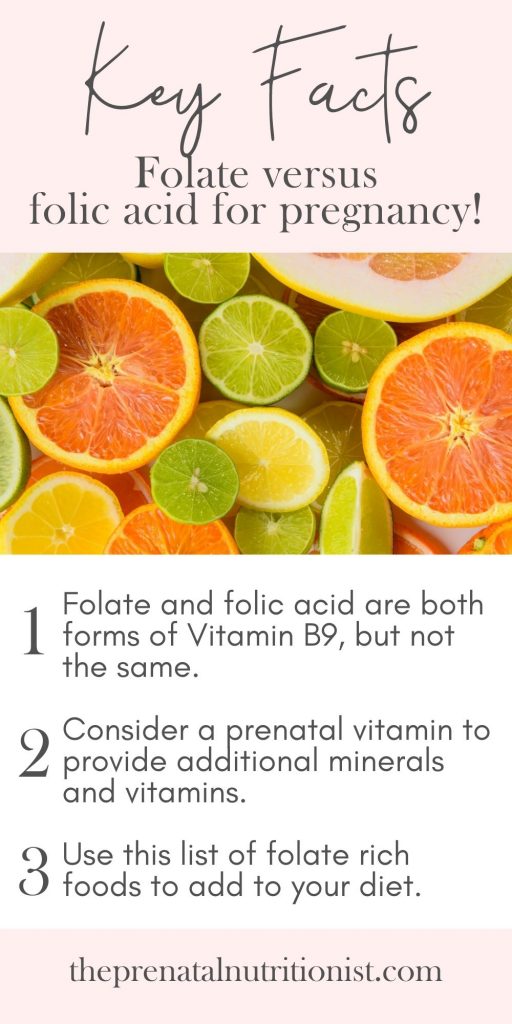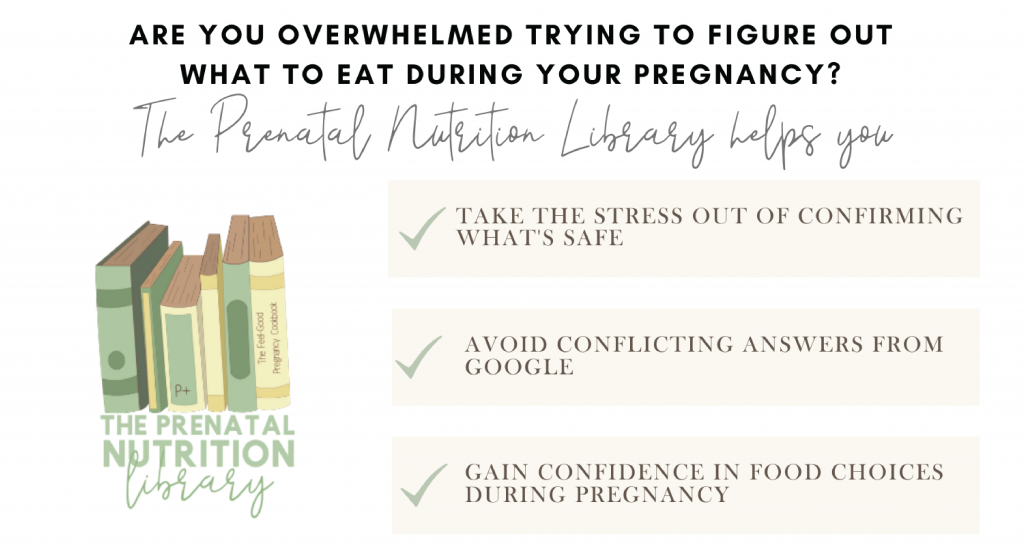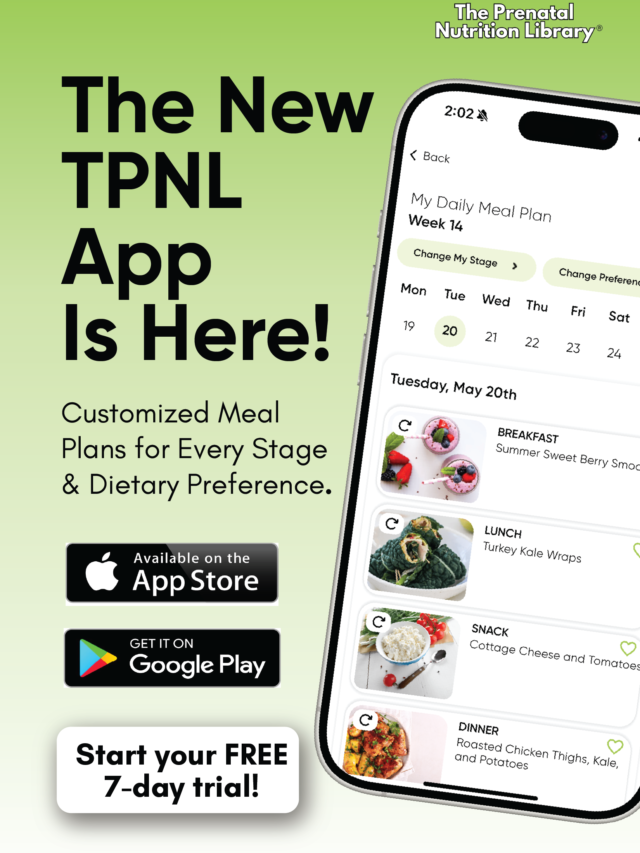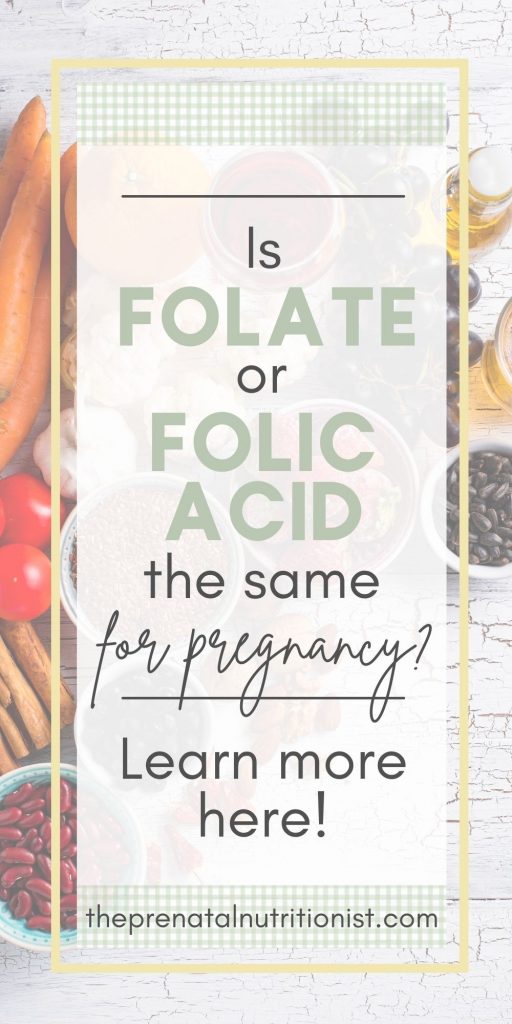
It’s key to get all of the essential nutrients during pregnancy! That’s why prenatal vitamins are so popular among pregnant women. They provide future moms with reassurance that they are getting a boost in important vitamins and minerals needed to support their growing babies! One of these essential vitamins is vitamin B9, also known as folate/folic acid.
Vitamin B9 is needed for many processes in the body before and during pregnancy. It plays a huge role in the production of DNA and RNA, our body’s genetic material. This means it helps to grow genetic tissue and support the overall growth of your baby. The main role you probably know folate for is helping form the baby’s brain and spinal cord, therefore preventing any neural tube defects. It also cooperates with vitamin B12 to produce red blood cells and keep iron working properly inside of your body, which can help prevent anemia.
Even though folate and folic acid are both a version of vitamin B9, they’re not the same. People use their names interchangeably as if they’re the same thing, and well, they are the same nutrient, but definitely different. That’s why today’s post is dedicated to folate vs folic acid so you can learn the differences between these two forms of the vitamin. Keep reading to learn if they’re the same for pregnancy!
Is Folate Or Folic Acid The Same For Pregnancy?
Technically speaking, folate and folic acid are NOT the same for pregnancy! Yes, there are both forms of vitamin B9, but they’re different forms of it. The primary difference is that folate is a naturally occurring form of vitamin B9. Before this nutrient even enters your bloodstream, folate is converted into an active form of Vitamin B9: 5-MTHF (this is the most active form of folate!).
Folic acid is a synthetic form of folate, vitamin B9, also known as pteroylmonoglutamic acid. Since this is a synthetic form of B9 that needs to be converted into the vitamin in the liver instead of the digestive tract, not all of it gets turned into active B9. While folic acid is absorbed better by our bodies, it is not utilized by our bodies in the same way as folate. Folic acid is used to fortify foods like bread and cereal which means it is not naturally there, it is added.
Additionally, many people have problems processing folic acid and might be unknowingly experiencing a folate deficiency. Unprocessed or unmetabolized folic acid can even build up in the bloodstream and cause problems before and during pregnancy.
So between folate and folic acids, which one should pregnant women supplement with? The answer is individualized, however, most people will benefit the most from folate or L-methyl folate. This active form of vitamin B9 is typically your best option during pregnancy. It is great to consume both folic acid and folate but the majority of our intake should come from folate. Focus most of your energy on foods that naturally contain folate! Now let’s see some of the best sources of folate for pregnant women.
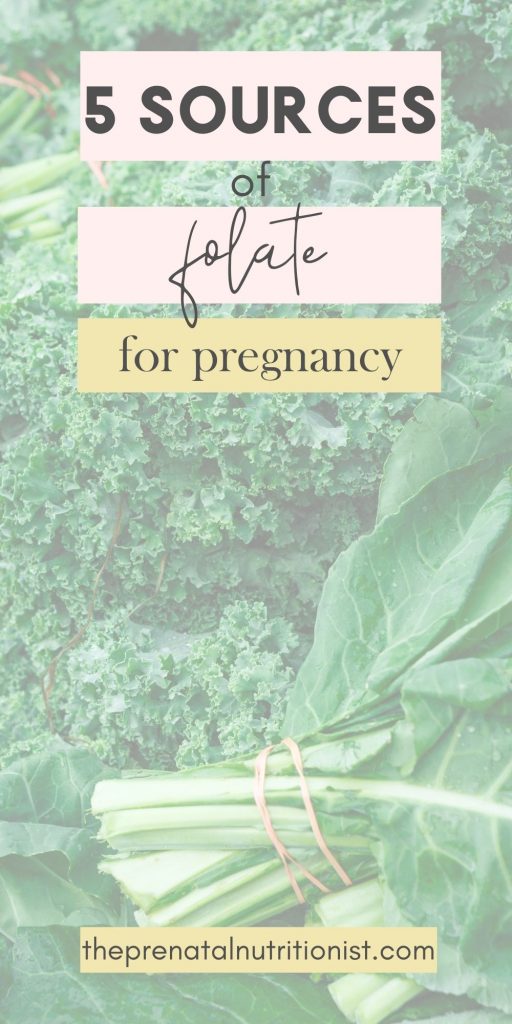
The Best Sources Of Folate For Pregnancy
Legumes
Legumes have several health benefits for pregnant women outside of the folate content, but they’re also a great source of to get more natural folate! The three types of legumes are beans, peas, and lentils. The exact amount of folate present in each one of the variations of these types depends, but it’s an overall high percentage. For example, one cup of kidney beans contains 131 mcg of folate. This is about 33% of the recommended daily value of natural folate! As you can see, legumes are a great source of folate. Be sure to include them in your weekly meal routine!
Eggs
Eggs are such a versatile food that it’s tough not to love them. You can eat them for breakfast, lunch, dinner, or even a snack. Plus, they have fantastic health benefits and are a strong source of natural folate and choline! One large egg is packed with 22 mcg of folate, almost 6% of the daily recommended value! Don’t forget to eat the yolk because this is where all the choline is and the folate.
Leafy Greens
Who doesn’t love leafy greens? Okay, maybe not while you are nauseous, but before or after that! They’re always on healthy food lists and are completely versatile and delicious! You can eat them in bulk as well, in a huge summer salad or warm quiche. Just be sure to wash them extra well.
Lucky for you I have some healthy pregnancy lunch ideas so you can get to planning your next week’s meals. And they are all work-friendly! If you add leafy greens to any of your meals you’ll also be sneaking some serious folate in there as well. Just take spinach as an example, one cup of this veggie provides you with 15% of all the natural folate you need for the day!
Citrus Fruits
It’s no news that citrus fruits are jam-packed with Vitamin C, but did you know they’re also a great source of natural folate? So tangerines, oranges, limes, grapefruits, and lemons should become a pregnancy staple. You can eat them in the morning alongside some eggs or yogurt! A large piece of these fruits usually contains 55 mcg of folate (this is the exact nutritional value of folate found in an orange) which is 14% of the daily recommended value. That’s a lot of folate in just one piece of fruit! Plus, that citrus fruits are also very hydrating.
Nuts and Seeds
If you love trail mix, then you’ll be happy to hear that nuts and seeds are great if you want to avoid being at an increased risk of folate deficiency. The amount of folate they contain varies depending on which type you eat. Still, they have several health benefits and you won’t want to leave them off your pregnancy diet!
Consider a Prenatal Vitamin
Finally, prenatal vitamins are always a good choice for those who are trying to conceive or are currently pregnant. You can look for a prenatal vitamin that includes folate in addition to consuming folate-rich foods. It is unnecessary to supplement with both folate and folic acid.
Many companies market the two of them as the same, as mentioned before, so be sure to read the label carefully. And, if you don’t know how to approach these supplements, or are still totally confused then head over to The Prenatal Nutrition Library where I break down what to look for and give plenty of specific recommendations.
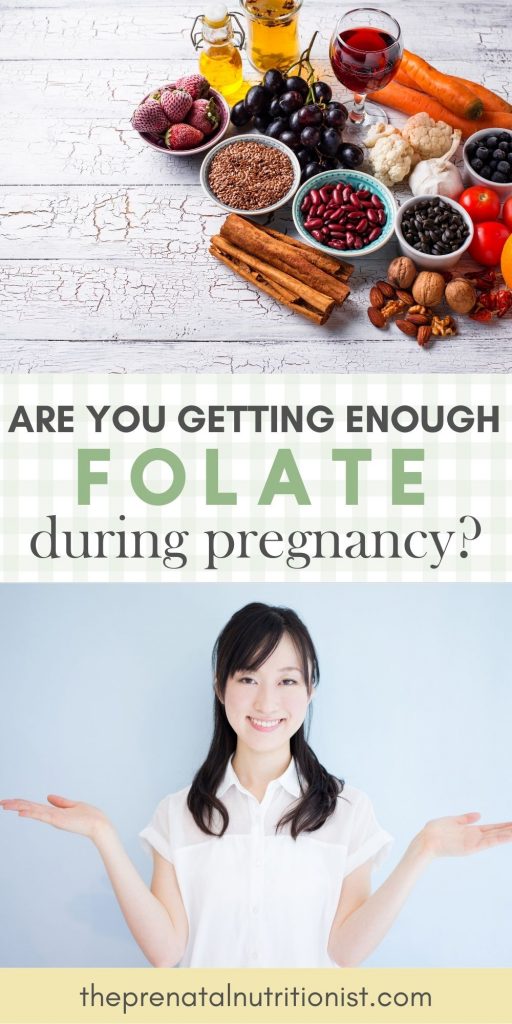
Are you getting enough folate during pregnancy?
This is a great start to understanding the difference between folate and folic acid for pregnant women! As you can see, folate is a key nutrient for pregnant women, especially during early pregnancy. So, make sure to get as much of it as you can through food! And if you think you might not be getting enough folate, consider taking a supplement and reviewing this with your registered dietitian.
Again, focus on the sources of folate mentioned in this article and ensure you’re eating foods from all the food groups during pregnancy. For more comprehensive nutrition advice for pregnant women, check out The Prenatal Nutrition Library. This digital space has all the info you need straight from a registered prenatal dietitian nutritionist!
